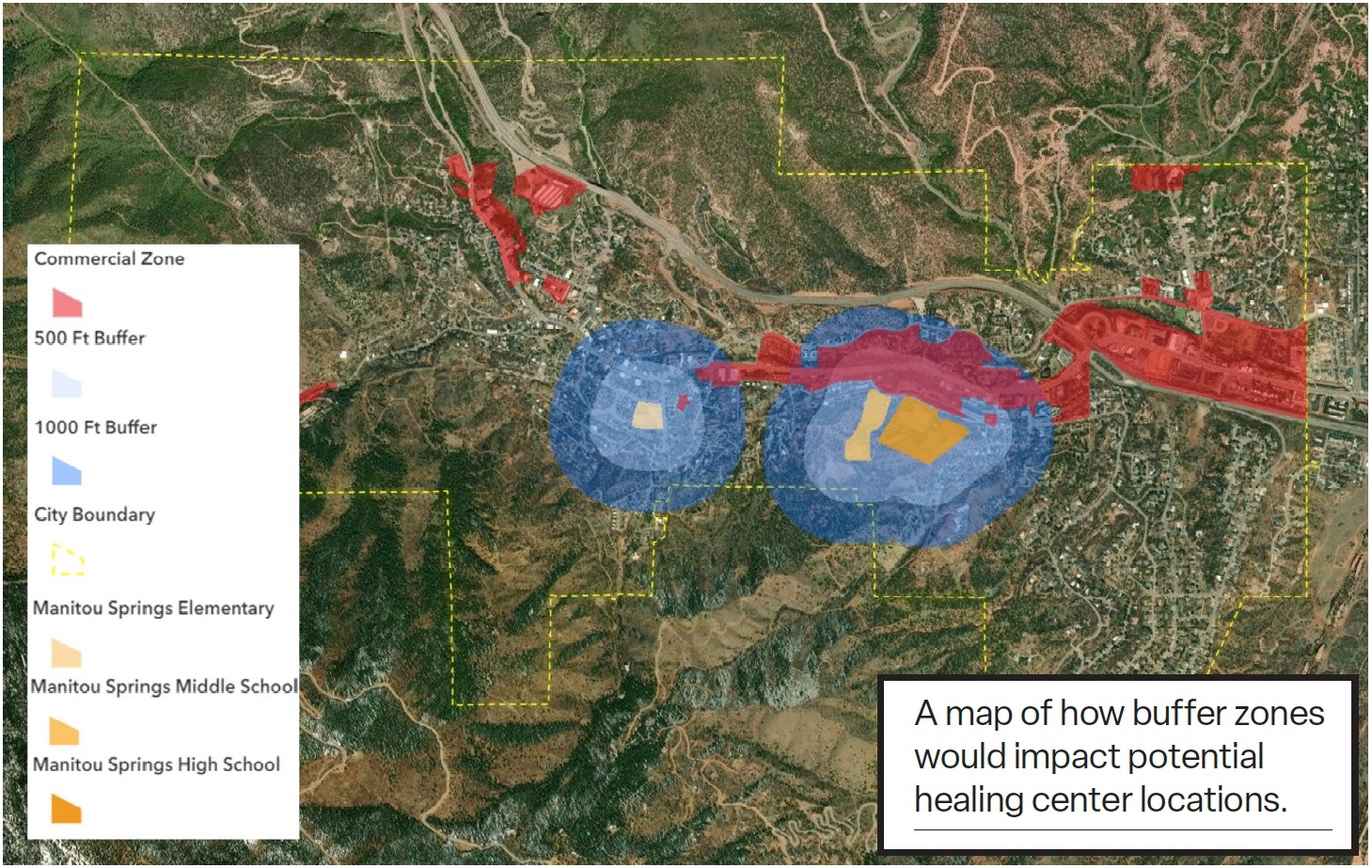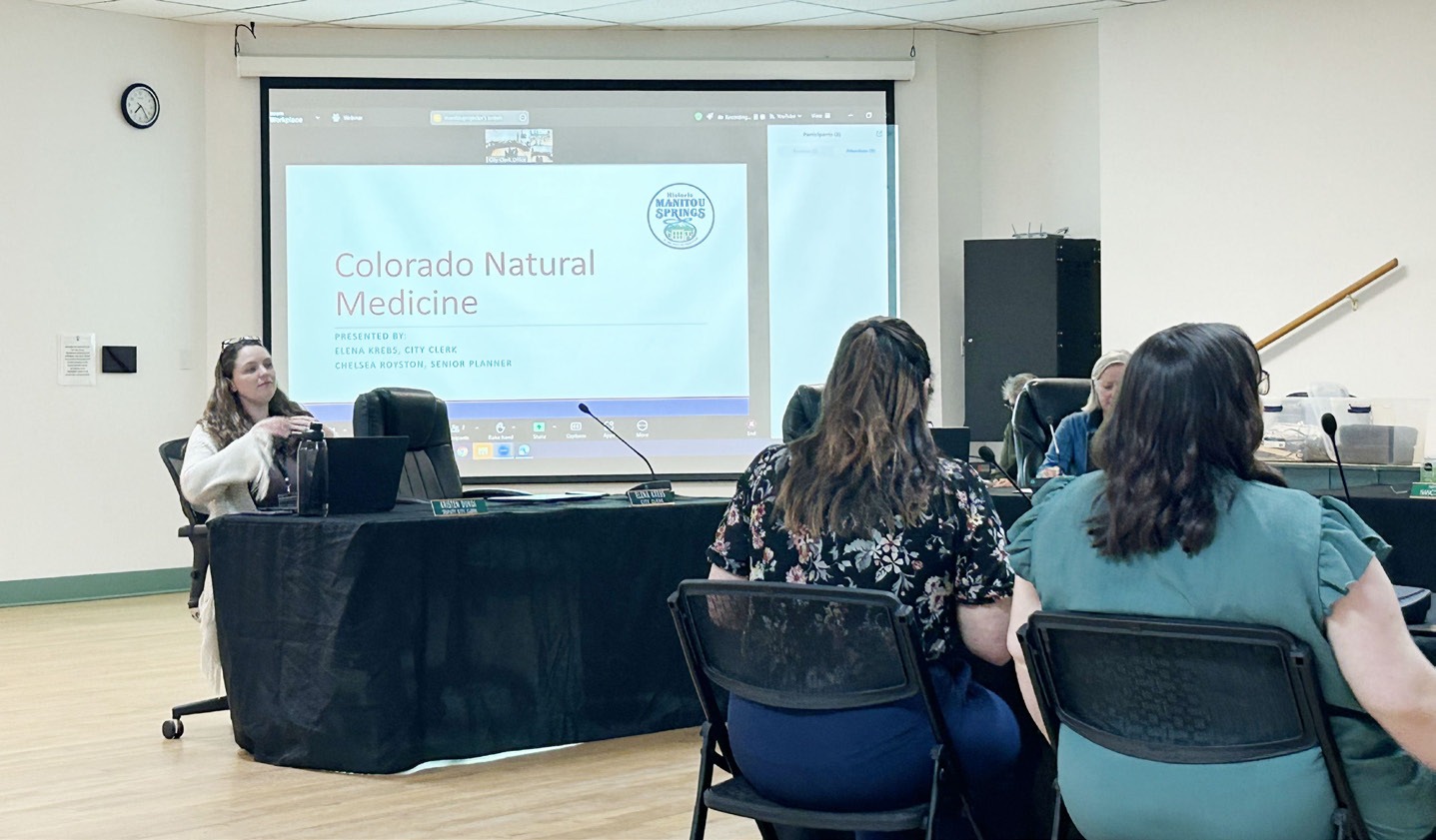Colorado’s Proposition 122, passed by voters in 2022, allows for legal regulated access to psilocybin mushrooms and psilocin. This week the Manitou Springs City Council considered regulation of “natural medicine healing centers,” or facilities where individuals can access psychedelics and hopefully have a nice trip.
“Overall the state is the primary entity that will be handling all of this licensing, and for the local municipalities all we can do is regulate the time, the place, and the manner in which these are operated,” explained City Clerk Elena Krebs. “The state is expected to begin the licensing as of Dec. 31 this year, and if we don’t have any adopted rules or regulations in place by then, that means we don’t have any say in where they are or how they operate.”
City Planner Chelsea Royston looked to other municipalities in Colorado for inspiration. “We did a review of peer communities,” said Royston. “A couple that stood out to us was Parker, which allows use by right in specific zone districts. They do buffer 1,000 feet from residential zone districts. They have screening requirements similar to what we see with marijuana, where you cannot see from the public right of way into the business. They also limit the hours of operation, and there are local penalties for individuals who grow outside of what is allowed.”

Krebs explained that natural medicine healing centers are required to monitor customers for the entire duration of their experience, and to ensure there are no complications from the use of psychedelic substances. “There is an administration session, a preparation session and an integration session,” she explained. “With the administration session, so far the rulemaking is the facilitators need to establish a plan that the participant is going to be getting home safely. They go over their mental health history, because it is suggested that you should not partake in these natural medicine services if you have any sort of mental health issues such as you’re on SSRIs.”

Individuals taking anti-depressants such as SSRIs [selective serotonin reuptake inhibitors] can have adverse interactions with psychedelic substances called serotonin syndrome, a potentially life-threatening drug reaction in which the body has too much serotonin. Both SSRIs and psychedelic drugs affect the same pathways in the brain, leading to possible serotonin syndrome.
City Councilor Judith Chandler also had some insight from other municipalities. “I attended an annual seminar of [Colorado Municipal League], municipal law, and I attended primarily to attend this breakout session on Prop 122,” she said. “It was very informative. The town attorney from Castle Rock, the assistant attorney from Boulder, and the town attorney from Parker were there sharing their experiences. By and large, at least in Castle Rock and Parker, there was quite a bit of resistance. Folks wanted to go with the most restrictive route, but there was a very robust discussion afterwards. The discussion was all on time, place, and manner of restrictions, and all three of the moderators said the time restriction was the hardest for them to figure out because of the nature of when someone comes in, they’re in a psychedelic state for up to four to six hours, so one of the ways they restricted was the hours. Eight to five, Monday through Friday restricts quite a few people who work, and they don’t have any weekend hours. I agree with Mayor Pro Tem [Nancy Fortuin], if we’re going to proceed with this that we consider some evening hours and weekend hours as part of this process. You don’t want someone coming in at five and having a psychedelic experience and sending them home.”
In addition to considering hours of operations, City Council also considered buffer zones between natural healing centers and schools and parks. State law allows from a buffer of up to 1,000 feet, but municipalities can reduce or eliminate buffer zones if they choose.
“It seems odd that if you can’t leave until you’re done being high, why do they care if you’re near a park or near a school?” asked Councilor Julie Wolfe. “It’s not like you have syphilis and might have sex with a kid and give them a venereal disease.”
City Attorney Jeff Parker noted that it was similar to regulations around alcohol and marijuana facilities. “They just look at it as one of these activities they don’t want near certain facilities,” he said. “Same logic. You can reduce the distance limitations, you just can’t expand them.”
Mayor John Graham summarized Council’s discussion for Krebs and Royston, who will work to craft an ordinance. “Well, council, I’m wondering if it would be OK if we direct staff to go ahead with an ordinance the idea that we’d be requiring a conditional use permit [for natural healing centers], going through the processes as [city staff] recommended,” said Graham. “It would commercial [zoning], but we would still have to figure out if it’s all commercial or URA only, or commercial but not downtown. We have to come up with a [buffer] distance. Our average is about 785 feet. Maybe as a compromise we could come up with 750 feet? That can be decided later, and I’m not – personally, I don’t care a whole lot. I’m more concerned we have space available for businesses that might want to do this.”

